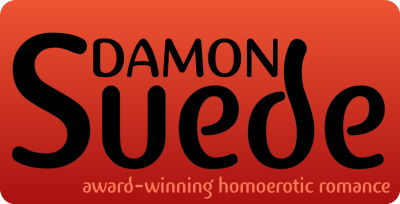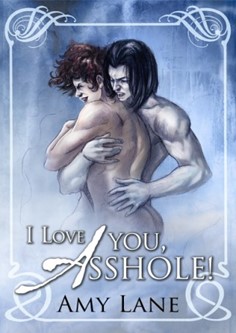Review: I Love You Asshole by Amy Lane
A delirious, delightful seriocomic romp which needs to be
read in context to be enjoyed thoroughly.
![]()
I really enjoyed this strange, sparkling, at-times-stunning
book from Amy Lane. It's an entertaining read, but an odd one…
almost certainly by design. Long beautiful sections seduced me into
the book's loose, louche world, but certain digressions confused me
greatly... More than anything I wish I had known Lane's entire
Little Goddess series before I read it. Nowhere on or in the book
(or its promo bits) was that series mentioned. In fact, I had no
idea this was part of a series until after I’d read it twice! My
unfamiliarity definitely interfered, but I had no way of knowing I
needed to be familiar with a series. More on this
shortly...
This is a straight-up vampire romance and even though the
two leads both identify as straight men, the narrative focuses not
on homoeroticism or larger gender tension, but kinds of
emptiness. That sounds more high-falutin’ than it should, but
it is the truth.
At core this is a book about crushes, a word which
Lane keeps reminding us is a verb as much as a noun. Both
heroes lose their lives by literal crushing and Lane
seems fascinated by the ways unrequited longings compress and
mutilate people. The hunger that makes the vampires feed, the lust
that makes them rut, the immortality that makes them detach, draw on
a single crushing vacuum they cannot fill, reducing solitary Life to
an endless, hopeless pouring and Love as the only fullness. Again,
if that sounds more serious than I mean it to, Lane presents some
pretty intense ideas in comical fancy dress to keep them
sexy and entertaining.
In this book, emptiness is a serious topic getting an often
goofy treatment as Marcus and Phillip circle a drain we hope will
claim neither of them. There are moments of piercing sadness and the
kind of angst that Lane conjures out of wisps and splinters between
two men. And then there are sections of blissfully wacky comedy that
leaven the loaf a bit... magical misbehavior and pixie gangbangs and
searing banter that made me laugh out loud. That being said, there
is a "neither-fish-nor-fowl" quality that isn’t unpleasant but
is strange.
Now, not to get all high-falutin’ again, but I'd argue that
Lane supports the Boethian view of Evil as the absence of Good, and
she seems to extrapolate from it that Pain is the absence of
personhood. She states explicitly at one point, “You're
not human, asshole. That doesn't mean you can't be a person!”
Suffering for her characters arises from the gnawing emptiness that
hunts and harms us all, even when we are undead. In this twilight
existence under Green's Hill, sex and feeding and community and
magic all battle this same crushing, sucking entropy… which is a
pretty somber idea to situate at the center of a witty 130 page M/M
vampire story.
Lane’s faith in the healing power of meaningful
relationships runs so deep that fucking (and the pleasure derived
thereby) becomes a kind of cosmic bandage on the wound we all carry.
There’s a blissful, puppy pile quality to the eroticism, and yet it
is sexy as hell and always rooted in character. In fact some of the
best character moments arise during or around intercourse. She
stresses this so explicitly that Marcus, our vampiric protagonist,
literally fucks suicidal depression out of his beloved and
repeatedly describes semen as being "like
blood but better. Like elf blood maybe, or shapeshifter blood with a
chocolate chaser." For Lane it is the connection of sex that
is powerful, not the meat or the motion, a clever and inherently
romantic idea producing instant drama.
Like the best paranormal fiction, Lane’s book explodes real
world emotions into otherworldly scope and skew. Marcus and Phillip
present an interesting pair of mismatched lovers, all vanity and
solipsism. The two heroes’ anger and loneliness and frailty thrive
in interlocking emptinesses: of vampirism, of narcissism, of
masochism, of debauchery, of unrequited desire. The emptiness
crushing Marcus and Phillip from within and without generates the
kind of languorous angst in which Lane revels ("only
to vampires did tears taste sweet"). Were this story focused
completely on the coming together of the two main characters I would
have no quibbles. More than once I suspected we would have been
better off sticking to the central frustrating relationship between
Marcus and Phillip… and that all the other fascinating digressions
(and tangential incidents and minor characters) were exactly that.
If I have a single overarching concern here it is Lane’s
handling of capital-T Time.
Years pass in a sentence, decades in a page, but then some
moments dilate into painstaking detail. Time is liquid, not
inexpertly but often idiosyncratically; my sense is that Lane wants
to dissect certain kinds of languor and anguish that come from long
waits, to trace the difference between death by a thousand cuts and
one sharp stake to the heart. In a story this length, she must
elide time and details that might be distracting or repetitive.
At times Marcus and Philip get buried in offstage incidents
and characters that arise (in these pages) as if from a vacuum. At
core this is a very simple story about a very direct conflict
between the main lovers, and yet in places Lane scrabbles to reach
certain seemingly predetermined moments and then pushes past YEARS
with barely a glance. Complicated subplots and characters appear as
near-sketches and blank announcements (Green, Grace, Bracken, Renny,
and the “enemy” etc). Tragedies and epic conflicts play out in the
course of a paragraph, and then a lovely two-minute scene
will take up six pages. In the rush to get too much predetermined
action down in too few pages, the narrative relies on a lot of
telling where showing would be more potent and more persuasive. A
little more mindful context would have gone a long way.
Though the world is beautifully motivated, it is not
specified in enough detail, reducing the stakes almost by default.
In practical terms, this adds to the feeling of rushing past
incidents and people which smudges the edges of the cool
worldbuilding. I can easily imagine the ways that this novella peeks
behind the curtains of a larger offpage story. But that story is not
always clear here because the Time is so patchy and we don't always
know when we are and why... interesting in a story
so centered on strains of emptiness.
I enjoyed Marcus and Phillip tremendously and loved the
slow crawling smolder of their union, but entire
(cursory-yet-cataclysmic) digressive storylines kept getting in the
way. Especially later in the book, the pace sometimes seemed to work
directly against the structure. Fascinating ideas about
sexual power and polyamory can’t land because they whip by us
without fully registering. A pivotal, spectacular death of a major
character happens so quickly it barely registers in the moment, but
then unspools delicately with a lingering impact that changes
everyone in the community. I wish I'd read this story as the
narrative sidebar it was obviously meant to be.
There are stunning moments of potency which explode on the
page often out of thin air: like Marcus being turned or
Cory’s “sunshine scream” or the
overnight garden. Bumped up against the instances of blank
reportage, the contrast make for a herky-jerky read. In essence, the
book becomes a chiaroscuro of glancing glibness and fascinating
depth, making me suspect that these rich ideas and characters needed
a book three times as long to meditate on emptiness more fully,
but they don't have Time to do so here.
A caveat for M/M purists: there is offpage heterosex in
this and LOTS of sex-positive swappage, but only in passing and
never explicitly described. It brushes very close to M/M/F turf, but
never trespasses. Given the polyamorous, “sensual and consensual”
world under the hill it stands to reason... but I felt I should
mention it.
Lest this sound too critical, please know that I'm going to
go pick up copies of the Little Goddess books now because I enjoyed
this as much as I did. If I have any disappointment it is that I
think there is a deeper, richer novel in these two men and their
relationship, this world, and these themes than Lane intended at
this point in the (unmentioned) series. That is less a criticism,
than an observation of possibility. There are times when
this book absolutely feels like an effervescent footnote to other,
sturdier books. And yet I really enjoyed reading it, enough that I’m
now going back to read the others so I understand some of the bits
that got short shrift in these pages.
A recommended read, but only if you read it in sequence.


